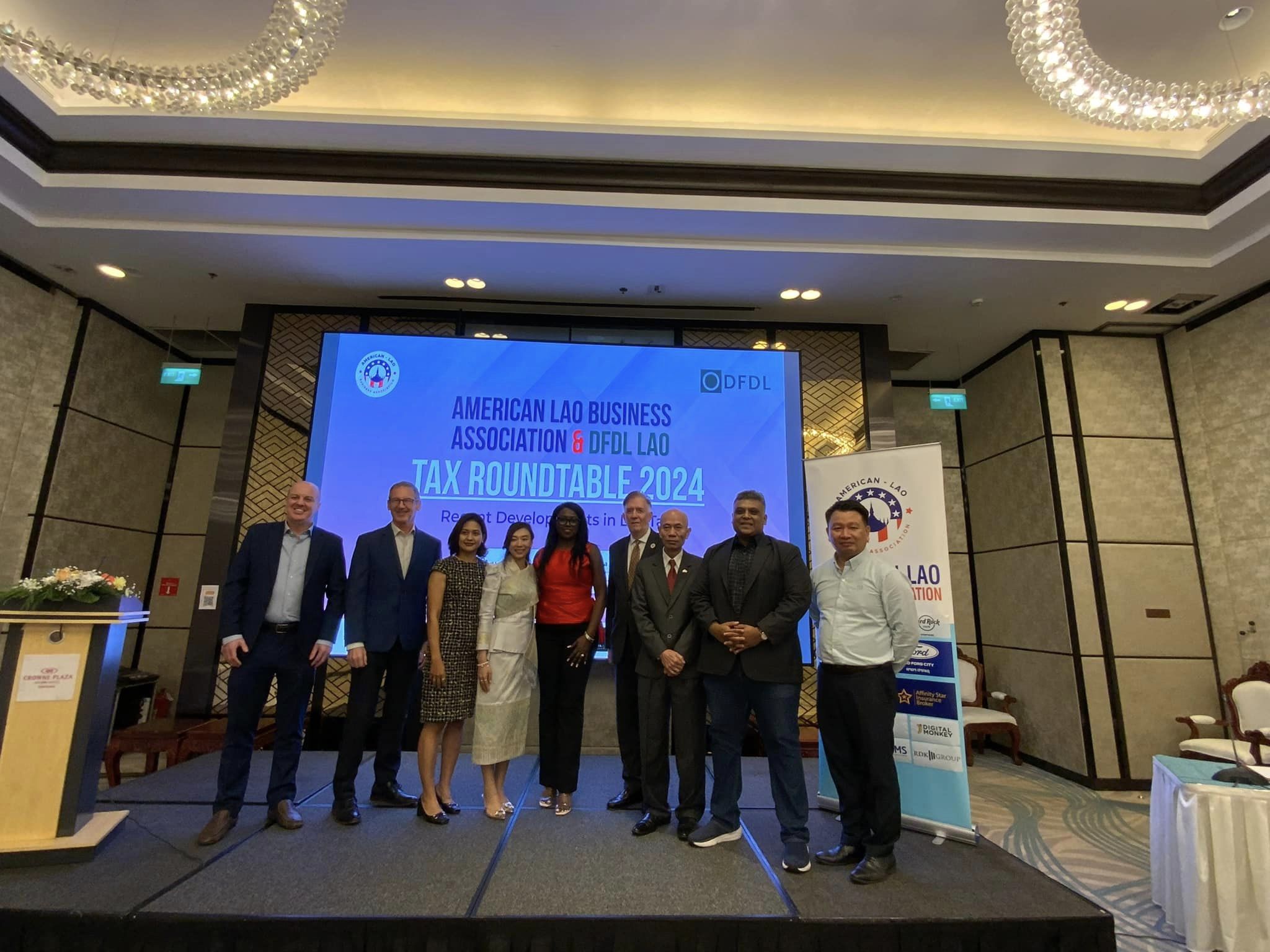The recent American-Lao Business Association roundtable on tax developments brought together industry leaders and tax professionals to address emerging challenges in Laos’ taxation landscape. With a primary focus on VAT changes, digital services taxation, and incentives for foreign investment, the event marked a crucial point for fostering collaboration and offering guidance on Laos’ tax regulations.
Anthony Galliano, representing the American Chambers of Commerce, emphasized the close partnership between the Association and the U.S. Embassy in Laos, stating, “American Chambers of Commerce work very closely as partners with the U.S. Embassies worldwide, and our collaboration in Laos is one of our greatest assets.” Galliano further highlighted the roundtable’s importance as the first industry-focused event post-COVID, describing it as “a pivotal moment as we strengthen business ties and resume impactful gatherings.”
Read More: Opinion – Why Dollarization Is the Solution to Laos’ Economic Woes
Key VAT Changes
One of the significant updates discussed was the VAT rate increase from 7% to 10%, effective as of May 2024. This adjustment reflects the Lao government’s push to increase fiscal revenue, aligning with broader regional tax practices. Galliano highlighted the importance of staying current on such changes, noting, “Tax is one of the most complex and challenging areas of business—it’s ever-changing, and mistakes can lead to significant penalties. It’s crucial to stay informed and get it right.”
A major focus was the newly implemented VAT obligations for non-resident suppliers of digital goods and services. As of August 1, 2024, foreign companies offering digital products to Lao customers must register, file VAT, and make quarterly payments through the National Treasury. Galliano commented on the importance of this move, which aligns Laos with a global trend toward taxing digital transactions and securing revenue from international e-commerce. This policy is expected to streamline VAT collection from cross-border digital service providers, with further details on compliance requirements anticipated from the Tax Department.
Enhancing Tax Revenue and Economic Development
With Laos’ tax revenue currently at only 13% of GDP compared to the OECD average of 34%, Galliano stressed the urgency of boosting this rate. “Increasing this is essential for economic development and public service enhancement,” he said. To address this, the government has outlined plans to broaden the tax base, strengthen enforcement, and pursue digitalization initiatives within tax administration. Galliano noted, “We aim to modernize tax administration through digitalization, broaden the tax base, and strengthen enforcement to support economic stability and growth.”
In the context of Laos’ regional competition for foreign direct investment (FDI), the event underscored the need for attractive investment incentives and clear tax policies. Galliano emphasized, “Laos is in regional competition for foreign direct investment. Attractive investment incentives, clear tax policies, and infrastructure are crucial to attracting investors.” The government’s continued focus on clarifying tax regulations is expected to improve investor confidence and draw more international businesses to Laos.
Business-Friendly Policies and Supporting The Private Sector
Galliano reiterated the American-Lao Business Association’s commitment to promoting business-friendly policies and supporting the private sector. “The Association is well-positioned to support businesses and the government, engaging in public-private dialogue and forming advocacy committees to add value,” he said. This dedication to advocacy reflects the Association’s mission to assist members in navigating Laos’ evolving tax landscape while fostering an environment conducive to growth and compliance.
Jack Sheehan, Partner and Tax Leader at the firm said:“It was great to collaborate with the American Lao Business Association and to see a full house of attendees for the tax event. There were lots of questions and it’s clear that taxes remain an important concern for investors in Laos and the broader region. We look forward to working with the American Chamber again.”
The roundtable underscored the importance of collaboration between the public and private sectors to adapt to the evolving tax environment in Laos. The event demonstrated the value of proactive engagement for businesses operating in Laos, with an emphasis on staying informed, adhering to regulatory changes, and fostering sustainable economic development.
For more information on DFDL Laos contact below:
Visaya Office Building, 4th Floor,
249 Lao-Thai Road, Vatnak Village,
Sisattanak District, Vientiane, Lao PDR
+856 21 316 871/72/72





